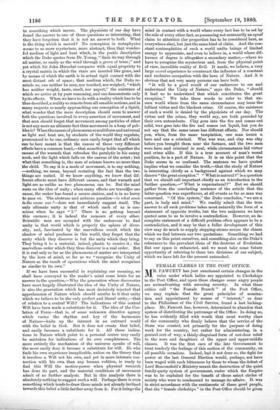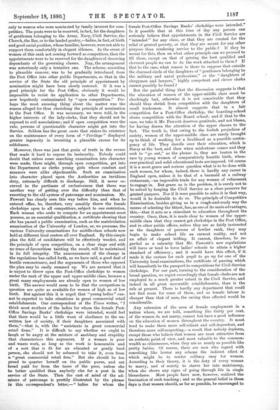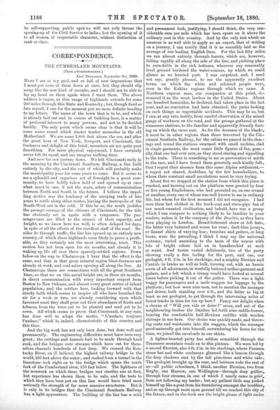FEMALE CLERKS IN THE POST OFFICE.
MR. FAW CETT has just sanctioned certain changes in the rules under which ladies are appointed to Clerkships in the Post Office, and upon these changes some angry people are animadverting with amusing severity. In what these critics call "the Female Branch" of the Post Office, we may explain that the great principles of nomina- tion and appointment by means of "interest," so dear to the Philistines of the Civil Service, found a last lurking- place. Mr. Fawcett has, however, determined to abandon that system of distributing the patronage of the Office. In doing so, he has evidently filled with wrath that most worthy class of the community who firmly believe that the service of the State was created, not primarily for the purpose of doing work for the country, but rather for administering, in a genteel sort of way, a thinly-disguised form of out-door relief to the sons and daughters of the upper and upper-middle classes. It was the first care of the late Government to treat tenderly the feelings of this section of the community, on all possible occasions. Indeed, had it not done so, the fight for power at the last General Election would, perhaps, not have been waged with such bitterness by those to whom the defeat of Lord Beaconsfield's Ministry meant the destruction of the quiet family-party system of government, under which the Empire was to be exploited for the benefit of those select circles of society who were to condescend to manage its affairs. It was in strict accordance with the sentiments of these good people, that the "female clerk.ships " in the Post Office should be given only to women who were nominated by family interest for 00111- petition. The posts were to be reserved, in fact, for the daughters of gentlemen belonging to the Army, Navy, Civil Service, the Church, the Bar, or to the landed gentry,—ladies, in fact, of birth and good social position, whose families, however, were not able to support them comfortably in elegant idleness. In the event of women of this rank not coming forward as competitors, then the appointments were to be reserved for the daughters of deserving dependants of the governing classes. Nay, the arrangement was notoriously only a tentative one. The scheme, according to plausible rumour, was to be gradually introduced from the Post Office into other public Departments, so that in the service of the State the old principle of appointment by nomination might have been slowly restored. If it was a good principle for the Post Office, obviously it would be impossible to resist its application to other Departments, now hopelessly contaminated by "open competition." Per. haps the most amusing thing about the matter was the reason alleged for thus cherishing the principle of nomination in the Post Office. It was necessary, we were told, in the higher interests of the lady-clerks, that they should not be exposed to evil associations; and if open competition were the rule, persons of questionable character might get into the Service. Seldom has the great caste that stakes its existence on the maintenance of every form of " Privilege " displayed greater ingenuity in inventing a plausible excuse for its selfishness.
Moreover, there was just that grain of truth in the excuse that made it hard to expose its insincerity. Nobody could doubt that unless some searching examination into character were made, there might, through open competition, get into the Department as clerks young girls whose conduct and manners were alike objectionable. Such an examination into character placed upon the Authorities an invidious duty, extremely difficult to discharge. Still, it never oc- curred to the partisans of exclusiveness that there was another way of getting over the difficulty than that of resorting to the old system of patronage and nomination. Mr. Fawcett has clearly seen this way before him, and when he entered office, he, therefore, very sensibly threw the female clerkships open to all competitors, subject to one restriction. Each woman who seeks to compete for an appointment must possess, as an essential qualification, a certificate showing that she has passed a public examination, such as the matriculation examination of the University of London, or, we presume, the various University examinations for middle-class schools now held at different local centres all over England. By this simple plan the field of candidature will be effectively weeded, and the principle of open competition, on a clear stage and with no trace of favouritism tainting the result, will be maintained in its full integrity. The announcement of the change in the regulations has called forth, as we have said, a good deal of hostile remonstrance, and the arguments of those who opposed the plan may be easily summed up. We are assured that it is unjust to throw open the Post-Office clerkships to women • under the rank of the upper and upper-middle class, because a great many employments are already open to women of low birth. The answer would seem to be that the occupations in question are quite as available for women of high as of low birth. But against this it is urged that "young ladies" can- not be expected to take situations in great commercial retail establishments. One correspondent of the Times writes, "I think most mothers of the ladies for whom the female Post- Office Savings Banks' clerkships were intended, would feel that there would be a little want of obedience to the un- written law of society, if their daughters associated with them,"—that is, with the "assistants in great commercial retail firms." It is difficult to say whether we ought to laugh or be angry at the mixture of snobbery and stupidity that characterises this argument. If a woman is poor and wants work, so long as the work is honourable and of a sort that is fit for an educated or gently bred person, she should not be ashamed to take it, even from a "great commercial retail firm." But she should be too proud to quarter herself on the public purse, and eat bread paid for from the taxes of the poor, unless she be better qualified than anybody else for a post in the service of the State. Then the cast of mind of the ad- mirers of patronage is prettily illustrated by the phrase in this coi respondent's letter,—" ladies for whom the
female Post-Office Savings Banks' clerkships were intended." Is it possible that at this time of day any person can seriously believe that appointments in the Civil Service are " intended " for any class, or that they are created for the relief of genteel poverty, or that they are meant for any other purpose than rendering service to the public ? If they be meant for this, then on what other principle can we proceed to fill them, except on that of getting the beet qualified and cleverest people we can to do the work attached to them? If that be the case, what reason is there to suppose that outside the charmed circle of the daughters of "gentlemen belonging to the military and naval professions," or the "daughters of clergymen and lawyers," highly competent and clever clerks cannot possibly be found ? But the painful thing that the discussion suggests is that the education of women of the upper-middle class must be shockingly bed, otherwise it is not conceivable that they should thus shrink from competition with the daughters of small tradesmen. It almost suggests that in a fair competition for a Post-Office clerkship, the boarding-school shuns competition with the Board school ; and if that be the case, we take it Mr. Fawcett deserves gratitude, and not blame, for having drawn the attention of the upper classes to the fact. The truth is, that owing to the foolish prejudices of society, women of the upper-middle class are rarely brought up to think of working for a livelihood as a possible contin- gency of life. They dawdle over their education, which is flimsy at the best, and then when misfortune comes and they seek to "go out," as the phrase is, they are beaten in the race by young women of comparatively humble birth, when- ever practical and solid educational tests are imposed. Of course it is a most grave and serious question what is to be done with such women, for whom, indeed, there is hardly any career in England open, unless it be that of a barmaid at a railway restaurant,--an impossible trade for any woman of refinement to engage in. But grave as is the problem, it is surely not to be solved by keeping the Civil Service as a close preserve for genteel paupers. Nor if it were possible to solve it in that way, would it be desirable to do so. The principle of Competitive Examination, besides giving us in a rough-and-ready way the means of selecting the fittest, has, as one of its main advantages, this,—that it acts as a stimulant to education throughout the country. Once, then, it is made clear to women of the upper- middle class that they cannot get clerkships in the Post Office, and in other public offices, unless they are as fairly instructed as the daughters of persons of lowlier rank, they may begin to make school life an earnest reality, and not an affair of elegant trifling. It cannot, therefore, be re-
garded as a calamity that Mr. Fawcett's new regulations will force or tend to force ladies' schools to attain a higher standard of efficiency ; and it would have this effect, if it made it the custom for each pupil to go up for one of the University local examinations, the certificate of passing which will henceforth be the passport to competitions for Civil-Service clerkships. For our part, turning to the consideration of the broad question, we regret exceedingly that female clerks are not
employed to a much greater extent in the Civil Service, and
indeed in all great mercantile establishments, than is the rule at present. There is hardly any department that could
not find room for some of them, and as female labour is cheaper than that of men, the saving thus effected would be considerable.
Any extension of the area of female employment in a nation where, we are told, something like thirty per cent.
of the women do not marry, cannot but have a good influence on the education of women throughout the country. It must tend to make them more self-reliant and self-dependent, and therefore more self-respecting,—a result that nobody deplores,
except those who believe that women are most attractive from an a3sthetic point of view, and most valuable to the common-
wealth as citizenesses, when they are as nearly as possible like pretty babies. Of course, there are men who regard with something like horror any scheme the indirect effect of which might be to render celibacy easy for women.
According to their theory, it is the duty of every woman to marry, and of society to starve her into matrimony,
when she shows any signs of going through life in single blessedness. Most people have now, however, outlived the fascination of such teaching ; and as the general belief in these, days is that women should, as far as possible, be encouraged to
be self-supporting, public opin'on will not only favour the opening-up of the Civil Service to ladie3, bat the opening of it to all women of respectable character, without distinction of rank or class.




































 Previous page
Previous page